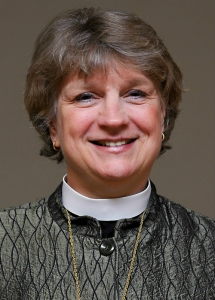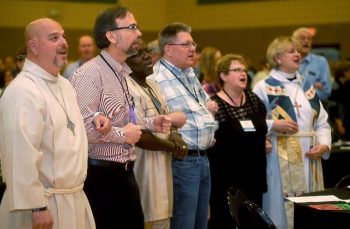 By Bishop Ann Svennungsen
By Bishop Ann Svennungsen
Hymns for $300: “If you cannot preach like Peter, and you cannot pray like Paul.”
“What is ‘There is a Balm in Gilead’?”
This was not your grandparents’ synod assembly. Instead of multiple resolutions, we had multiple table conversations; instead of perfunctory reports, we heard the ELCA’s Ruben Duran tell how Lutheran missionaries in Peru brought him to Jesus; instead of long lines during breaks, we had hot cinnamon rolls brought to our tables; instead of a lecture on racial justice, we heard the story of racism told through song in “My American Blues”; instead of long hours of uninterrupted listening, we had participants compete at JeoPARODY (see “Hymns for $300” above).
In addition to engaging presentations by David Lose and Barbara Lundblad, we had guided table conversations on how our own congregations would most effectively strive for racial justice, welcome immigrants, and grow as “real presence: in the neighborhood and with our neighbors.”
I try to envision my parents attending our assembly. They loved to tell me how, in 1960, they traveled from Shelby, Montana, to Central Lutheran in Minneapolis for the constituting convention of the American Lutheran Church. (As usual, they left their five-year-old daughter at home with Rose Ostrem.) I think my dad would have risked sitting through one meaningful table conversation and, then, used the next two for convenient cigarette breaks.
OH, SOMETIMES THE CHANGES to our synod assembly make us wonder if the experience is really necessary. If we only vote on one resolution besides budget, does that really merit 16 hours out of our time?
In his book Community: The Structure of Belonging, Peter Block writes that “the small group is the unit of transformation. Large-scale transformation occurs when enough small groups shift in harmony toward the larger change. The small group produces power when diversity of thinking and dissent are given space, commitments are made without barter, and the gifts of each person and our community are acknowledged and valued.”
“Large-scale transformation occurs when enough small groups
shift in harmony toward the larger change,” writes Peter Block.
Our Reference and Counsel Committee is more consistently asking the following question: Is a proposed resolution the best way to address an issue (e.g., asking a synod bishop to write a letter to President Trump)? Or, would congregational conversation and action make longer lasting impact?
Our synod assembly experience is always evolving. We take seriously the evaluations (both spoken and written) each year. I was recently reminded by one of our deans that healthy debate over an important resolution can be energizing, informative as well as impactful in the world.
We work hard on assembly. And we pray. We trust that the One who promises to be with us when two or three are gathered, will also be present when some 500 gather in Christ’s name.
